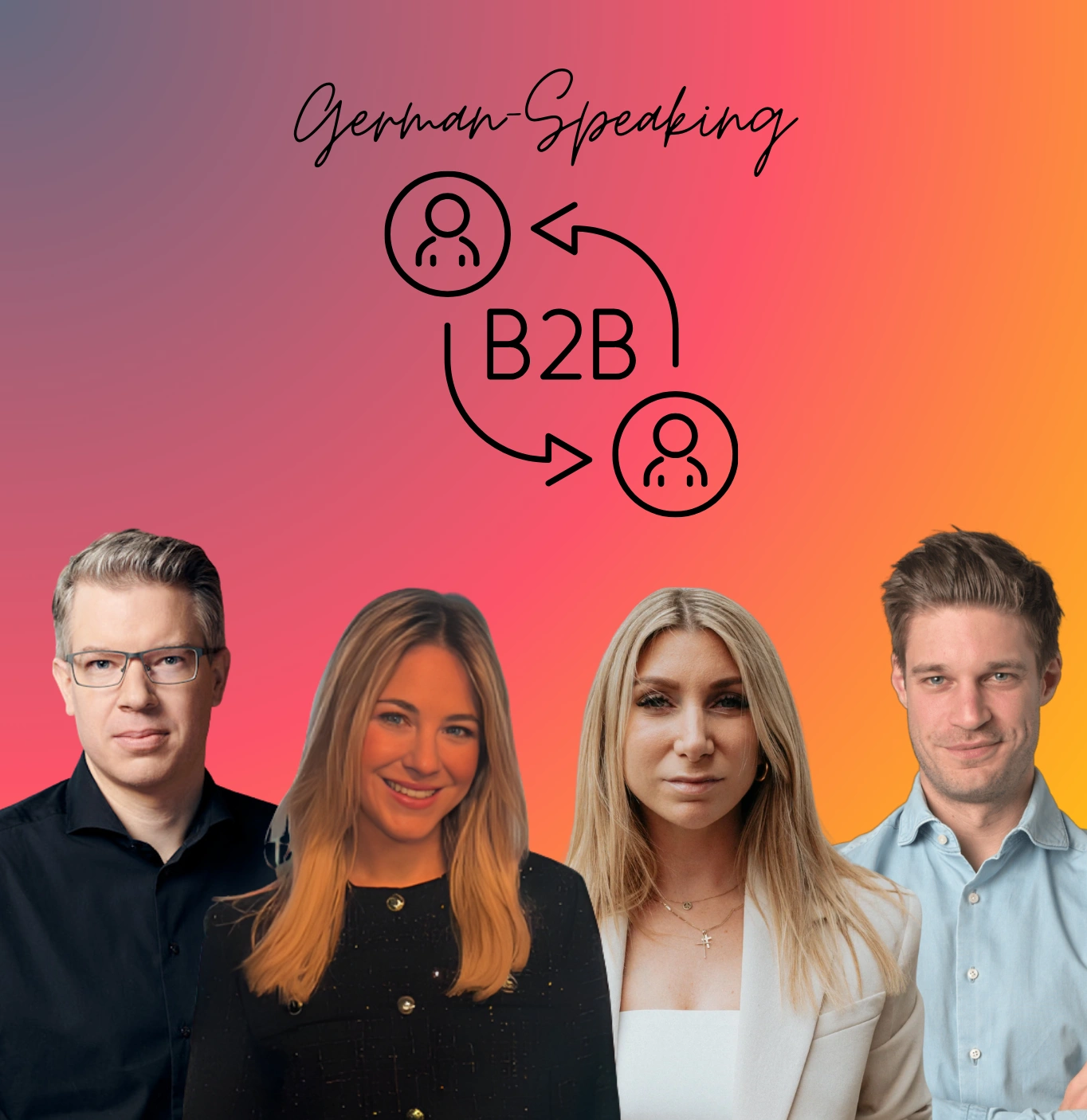Blog & Articles
Your ultimate ressource for the creator economy
Methodology & Rankings
About Favikon, rankings, tools & much more.
Insights
The recipe behind Favikon's viral & coveted rankings.
Free tools to power your influencer marketing workflows.
See Favikon users' success stories.
Get access to all Favikon rankings.
Become a Partner
Become an Affiliate
About the team behind Favikon
The place to talk creator economy, together


Featured Rankings

Here is the Top 50 Rising Video Creators on LinkedIn. Video is quickly becoming the platform’s most powerful format, with creators gaining more reach and engagement than ever. As Gen Z grows its presence and tools like BrandLink and Thought Leader Ads support content creation, LinkedIn is doubling down on video. This ranking, made in partnership with OpusClip, celebrates the creators leading this shift and aims to inspire anyone ready to start sharing through video.

Here is the Top 50 Rising Video Creators on LinkedIn. Video is quickly becoming the platform’s most powerful format, with creators gaining more reach and engagement than ever. As Gen Z grows its presence and tools like BrandLink and Thought Leader Ads support content creation, LinkedIn is doubling down on video. This ranking, made in partnership with OpusClip, celebrates the creators leading this shift and aims to inspire anyone ready to start sharing through video.
How to find B2B influencers?
Finding the right B2B influencers is critical for PLG SaaS and prosumer brands. Unlike B2C creators, B2B influencers build trust through expertise on platforms like LinkedIn, Substack, and YouTube. This blog breaks down where to find them, what to look for, and how tools like Favikon simplify discovery with authentic performance insights.
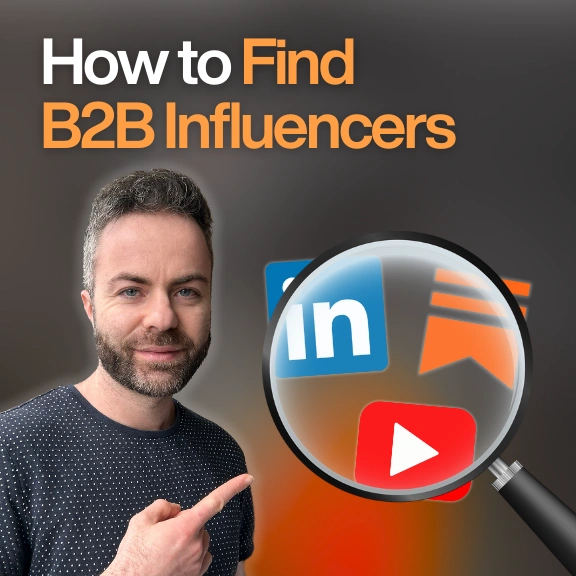


Jérémy Boissinot is the founder of Favikon, an AI-powered platform that helps brands gain clarity on creator insights through rankings. With a mission to highlight quality creators, Jérémy has built a global community of satisfied creators and achieved impressive milestones, including over 10 million estimated impressions, 20,000+ new registrations, and 150,000 real-time rankings across more than 600 niches. He is an alumnus of ESCP Business School and has been associated with prestigious organizations such as the French Ministry and the United Nations in his professional pursuits.
Check Brand DealsThe B2B influencer marketing landscape has fundamentally shifted. While traditional B2B relied on field sales and analyst reports, today's PLG (Product-Led Growth) SaaS and prosumer brands need a different approach. According to OpenView's benchmarks, 60%+ of the fastest-growing SaaS companies now use PLG models, making influencer marketing critical for bottom-up adoption.
Understanding the B2B Influencer Marketing Landscape
What Makes B2B Influencer Marketing Different
Unlike B2C lifestyle influencers, B2B influencers operate across professional platforms where decision-makers consume content. These creators provide authentic industry expertise rather than aspirational lifestyle content. They drive trust-based influence through long-form formats like newsletters, podcasts, and educational YouTube videos.
The creator economy and prosumer SaaS overlap is estimated to reach over $100B by 2030, making this intersection increasingly valuable for brands targeting both individual users and enterprise accounts.
Key Channels Where B2B Influencers Exist
LinkedIn: The primary professional network where thought leaders share industry insights, case studies, and professional advice. LinkedIn creators often have high engagement rates among C-suite executives and decision-makers.
Substack: Newsletter creators who build direct relationships with subscribers through regular industry analysis, insights, and recommendations. These creators often have highly engaged, niche audiences.
YouTube: Educational content creators who produce tutorials, product reviews, and industry deep-dives. Particularly valuable for prosumer SaaS brands as creators demonstrate real use cases.
The Current B2B Influencer Marketing Ecosystem
Agencies vs. Manual Search vs. Platforms
Agencies
Traditional agencies handle B2B influencer campaigns but often consume significant ROI through high management fees and markup costs. They typically work with larger budgets and established influencer relationships.
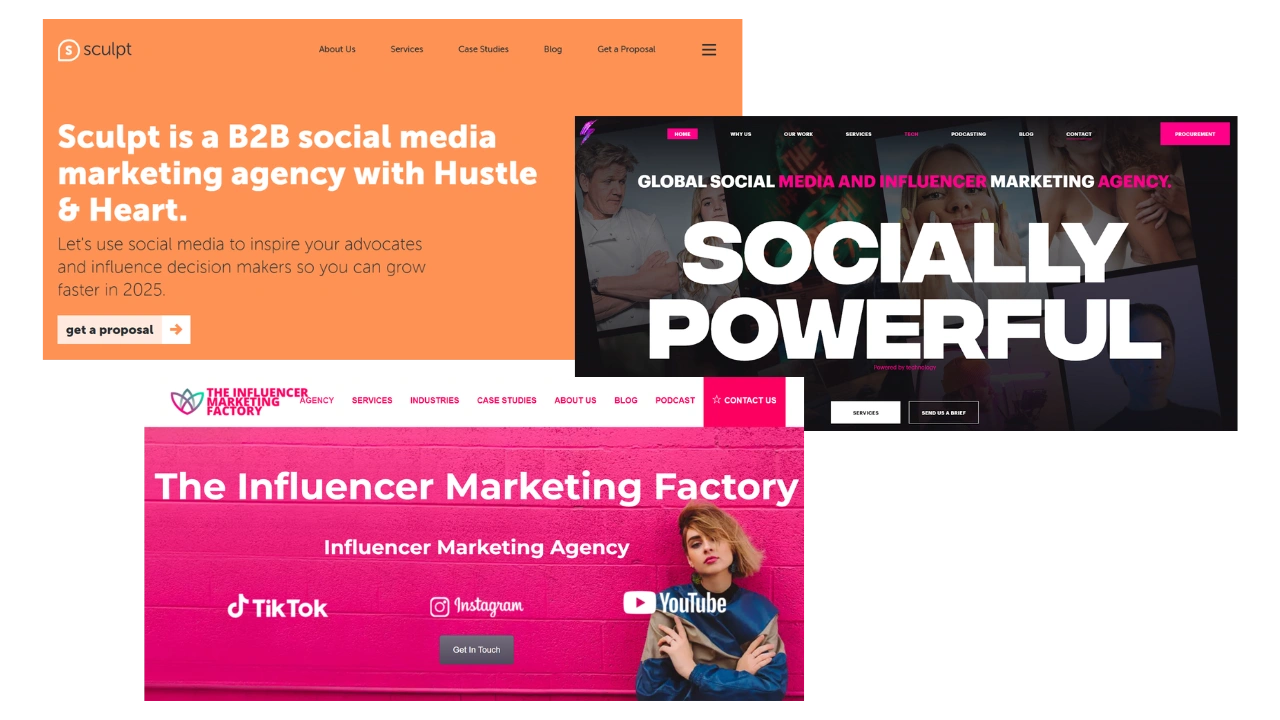
Manual Search
Many brands still rely on manual discovery through platform searches, which is time-intensive and lacks comprehensive data on creator performance and authenticity.
Platforms
Several platforms have emerged to address B2B influencer discovery needs:
Passionfroot focuses primarily on creator marketplace functionality and campaign management, connecting brands with influencers through a booking system. While it supports LinkedIn and Substack creators, it emphasizes marketplace transactions over deep analytics, offering basic engagement rates and collaboration metrics rather than comprehensive audience intelligence and authenticity verification.
Limelight positions itself as a B2B creator partnership platform with real-time analytics and LinkedIn support. While it offers campaign management and basic creator discovery across professional networks, it focuses primarily on partnership automation and campaign execution rather than comprehensive influencer intelligence and deep audience analysis.
Favikon is an AI-powered platform specifically engineered for B2B brands and agencies, providing comprehensive discovery and analysis across diverse platforms like Instagram, TikTok, LinkedIn, Substack, and YouTube. Unlike other tools that adapted consumer influencer features for B2B use, Favikon was built from the ground up to address the unique needs of PLG SaaS and prosumer brands seeking authentic industry experts and thought leaders.
Where manual search falls short, lacking historical data, authenticity verification, cross-platform analytics, and comprehensive engagement metrics, Favikon delivers complete creator intelligence. It provides what manual searching simply cannot: authenticity scoring, follower growth tracking, audience quality analysis, brand partnership history, and automated performance monitoring across all major B2B platforms.
Why PLG SaaS and Prosumer Brands Need B2B Influencers
Understanding Prosumer SaaS
Prosumer SaaS combines "Professional + Consumer", tools that look and feel like consumer products but serve professional use cases. Think Notion (students use it free, startups run entire operations on it), Canva (one designer starts, whole marketing teams adopt), or Loom (individuals try it, teams upgrade for workflows).
These brands bridge B2C adoption patterns with B2B monetization, making traditional B2B marketing approaches ineffective.
The PLG Growth Model
Product-Led Growth companies grow bottom-up rather than through sales teams:
- The product drives acquisition (no demos required)
- Users invite teammates naturally
- Teams adopt, then companies purchase enterprise plans
Examples include Slack (team adoption spread across organizations), Zoom (free calls led to enterprise licenses), and Figma (designer file-sharing forced organizational adoption).
Why Influencers Drive PLG Success
Influencers serve as the distribution engine for prosumer SaaS because:
- YouTube creators showcase Notion templates, driving signups
- TikTok tutorials on Canva/Synthesia create viral awareness
- LinkedIn thought leaders demonstrate Figma workflows, spreading B2B adoption
The funnel appears consumer-like at the top (influencers drive individual trials) but generates enterprise revenue at the bottom.
How to Find the Right B2B Influencers: Step-by-Step Process
Understanding Manual Search Methods (And Their Limitations)
Before diving into systematic approaches, it's important to understand why most brands struggle with manual influencer discovery and why specialized tools have become essential.
How to Manually Search Each Platform (And Why It's Inefficient)
LinkedIn Manual Search Process:
1. Use LinkedIn's search bar with keywords like "SaaS expert," "AI consultant," or "marketing automation"
2. Filter by "People" and add location/industry filters
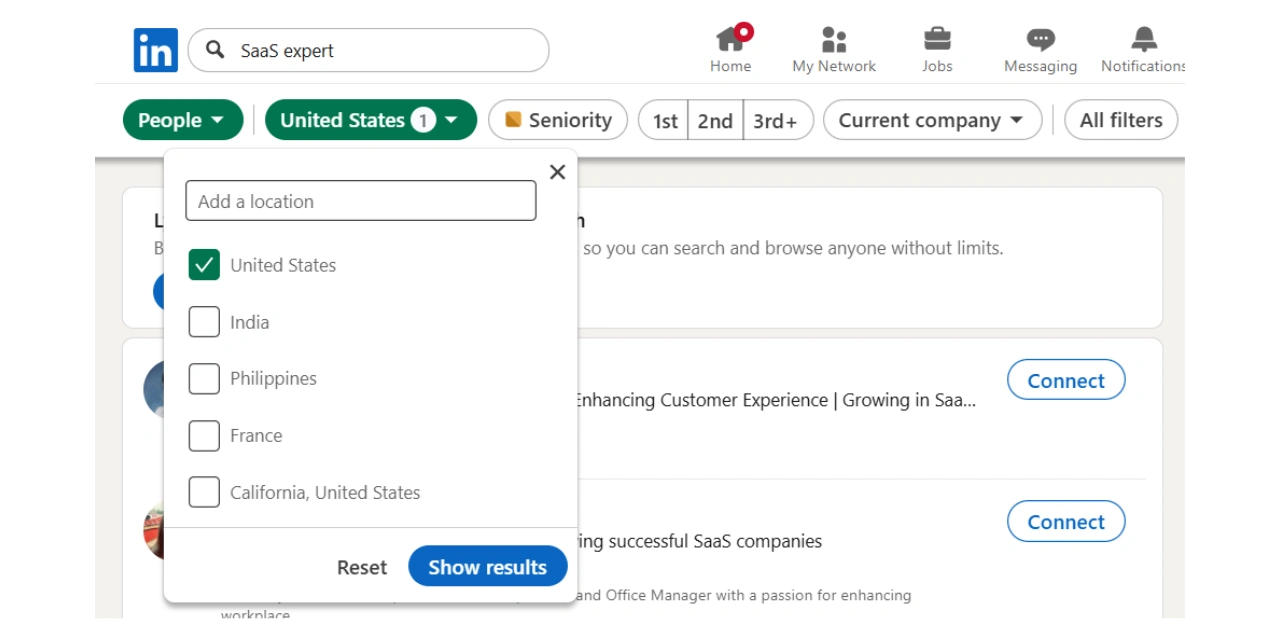
3. Look for profiles with LinkedIn "Top Voices" badges (blue badge for invitation-only influencers) or "Community Top Voices" badges
4. Check individual profiles for follower counts
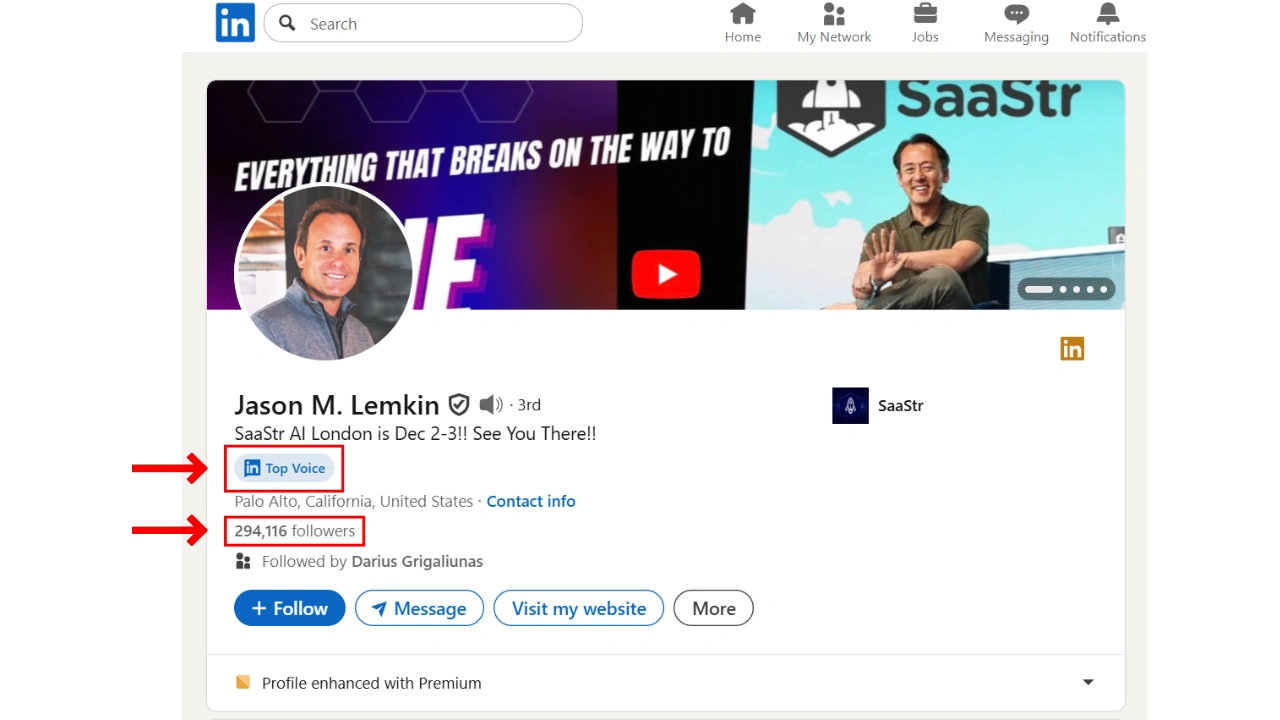
5. Manually scroll through recent posts to gauge engagement
6. Try to estimate posting frequency and content quality
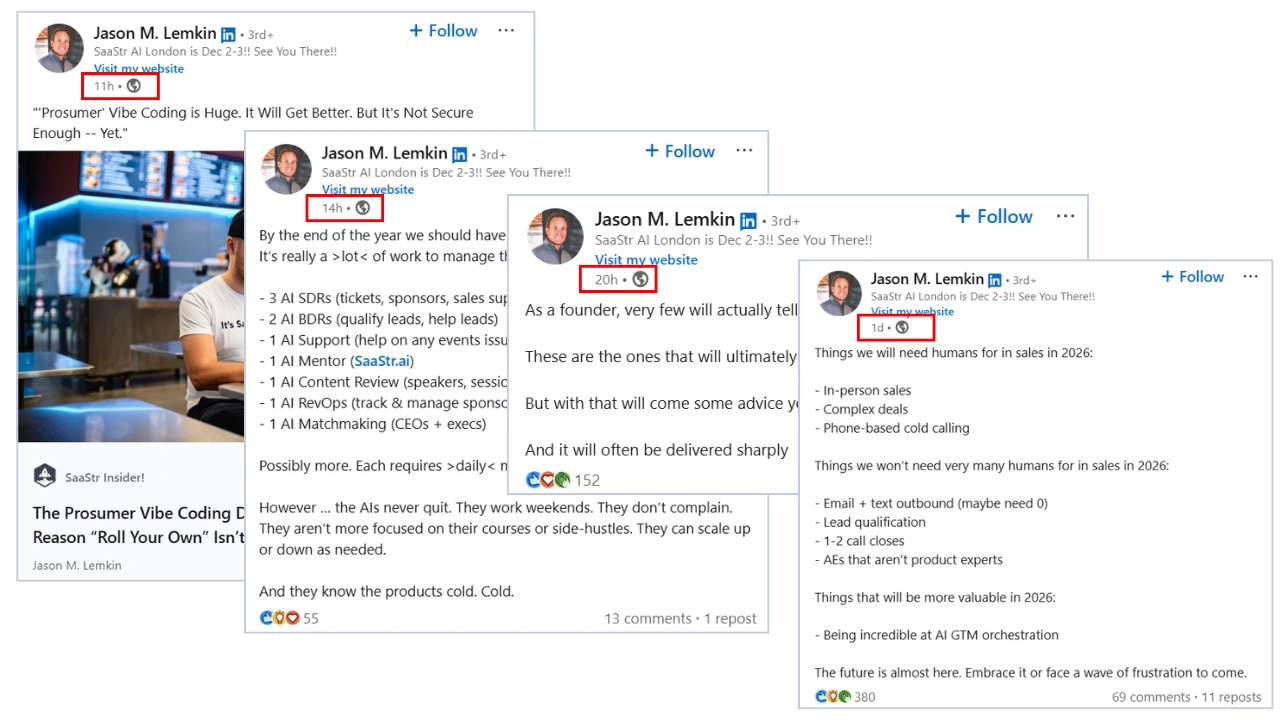
7. Search through comments to understand audience quality
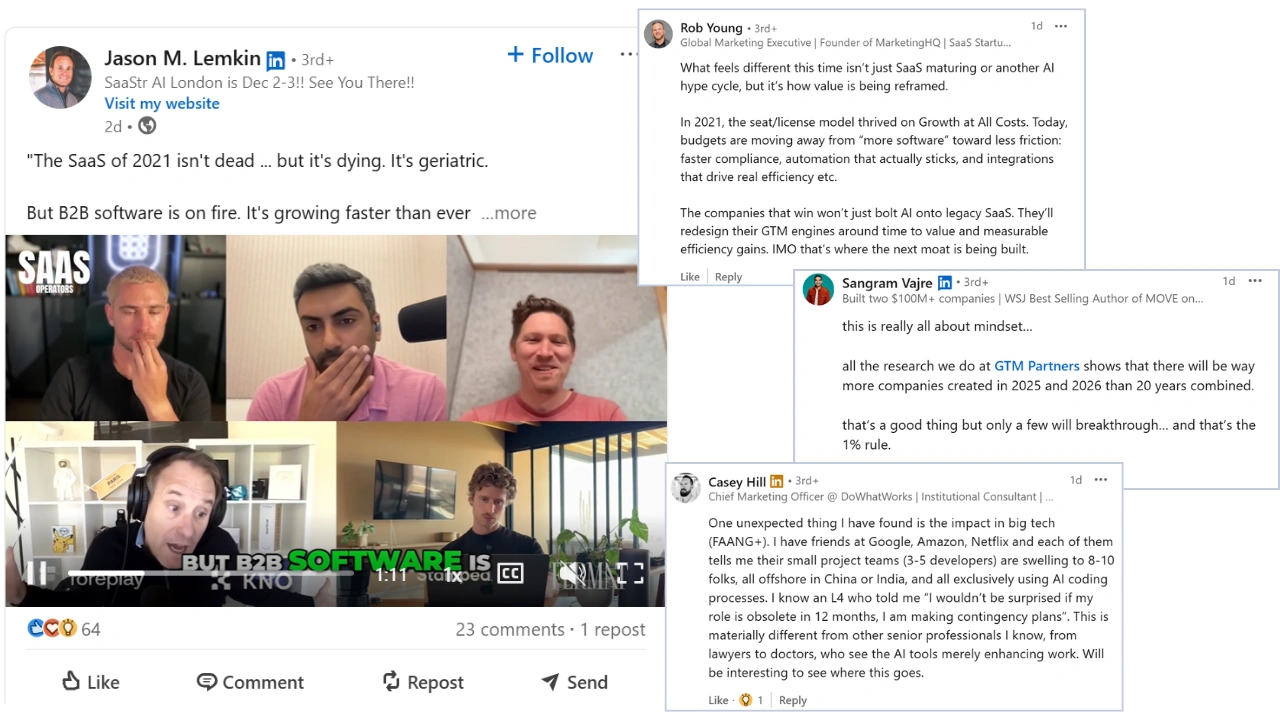
Limitations: LinkedIn shows follower counts for Creator Mode profiles, but detailed engagement metrics are limited, no historical performance data available, no authenticity verification, and follower demographics are only available to the profile owner.
Substack Manual Search Process:
1. Browse Substack's discovery page by category (Business, Technology, etc.)
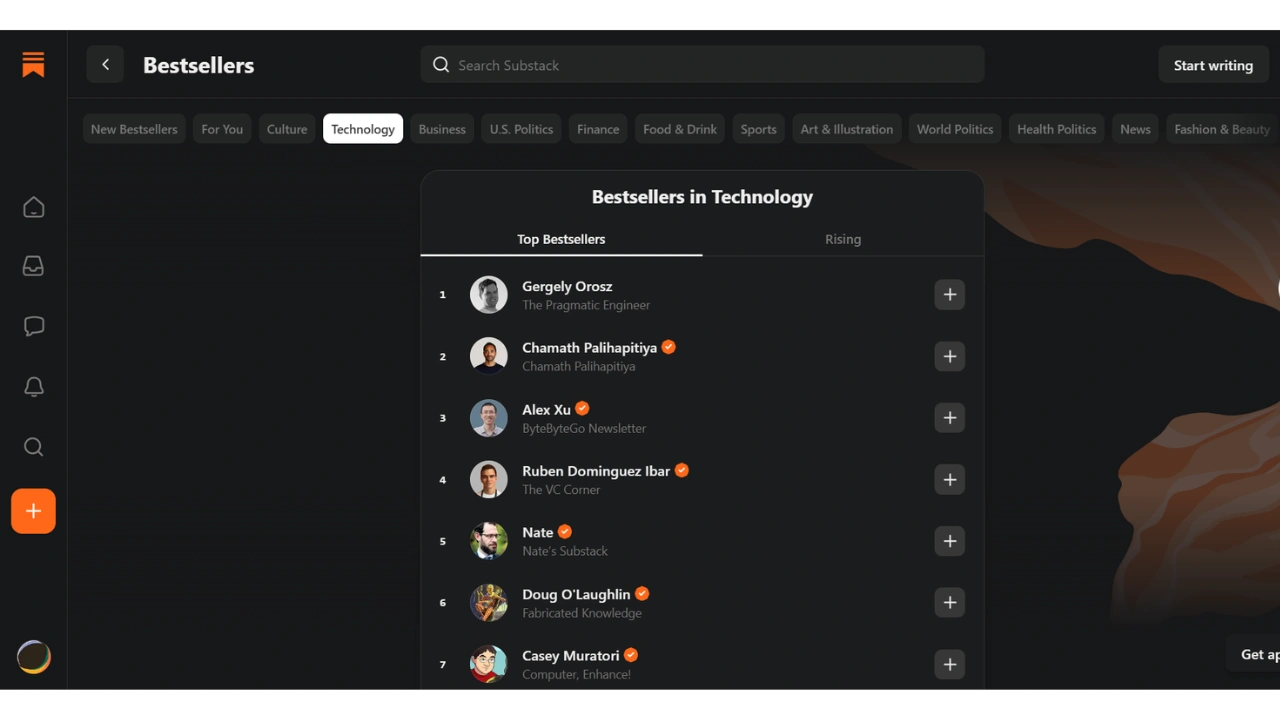
2. Use Substack's search function for keywords like "B2B," "SaaS," "startup"
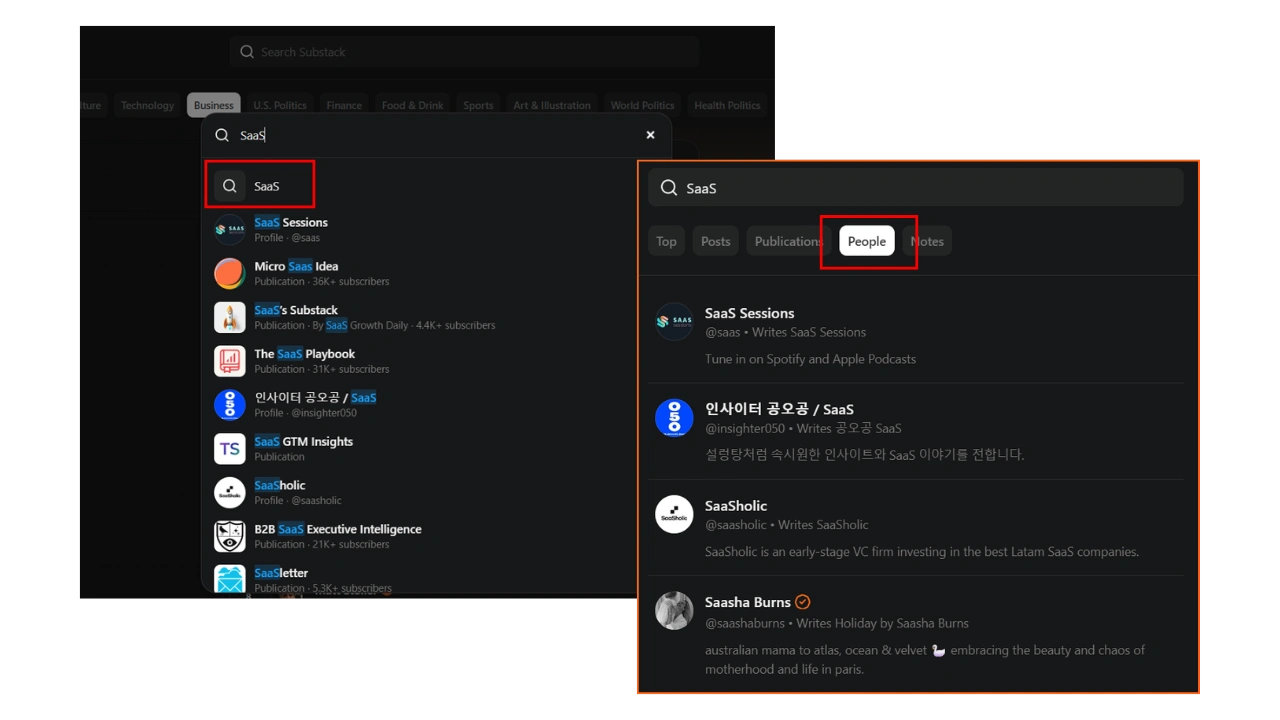
3. Check individual newsletter subscriber counts (when visible)
4. Read recent posts to assess content quality and comment engagement
5. Cross-reference writers' LinkedIn profiles for professional credibility
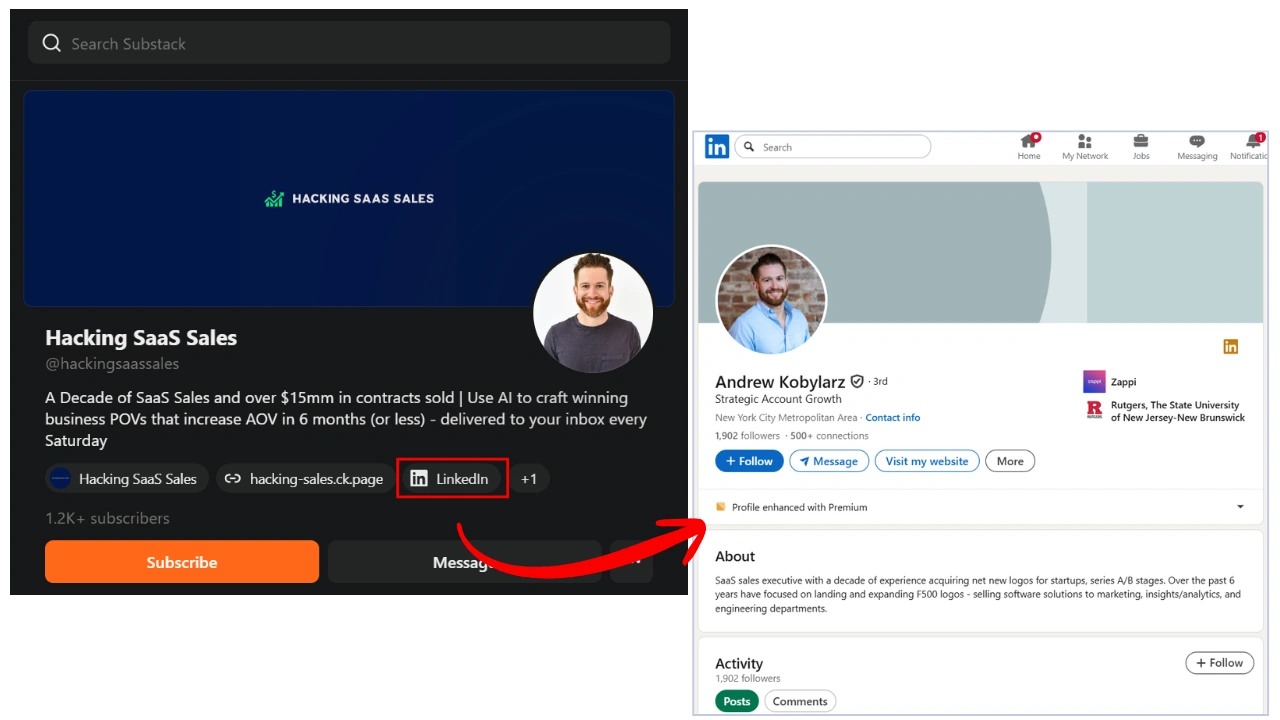
Limitations: Subscriber growth data unavailable, no engagement rate calculations, limited search functionality, no cross-platform analysis.
YouTube Manual Search Process:
1. Search for business/tech keywords like "SaaS review," "productivity tools," "B2B marketing"
2. Filter by upload date or type
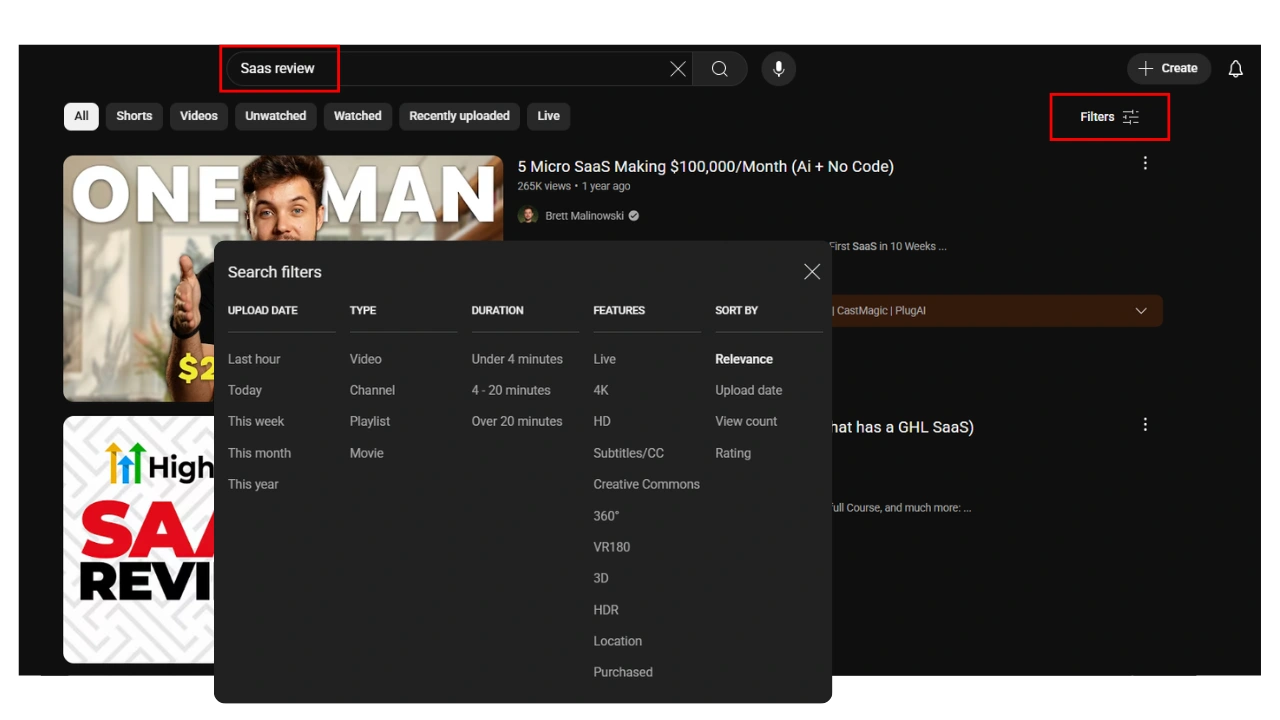
3. Visit individual channel pages to check subscriber counts
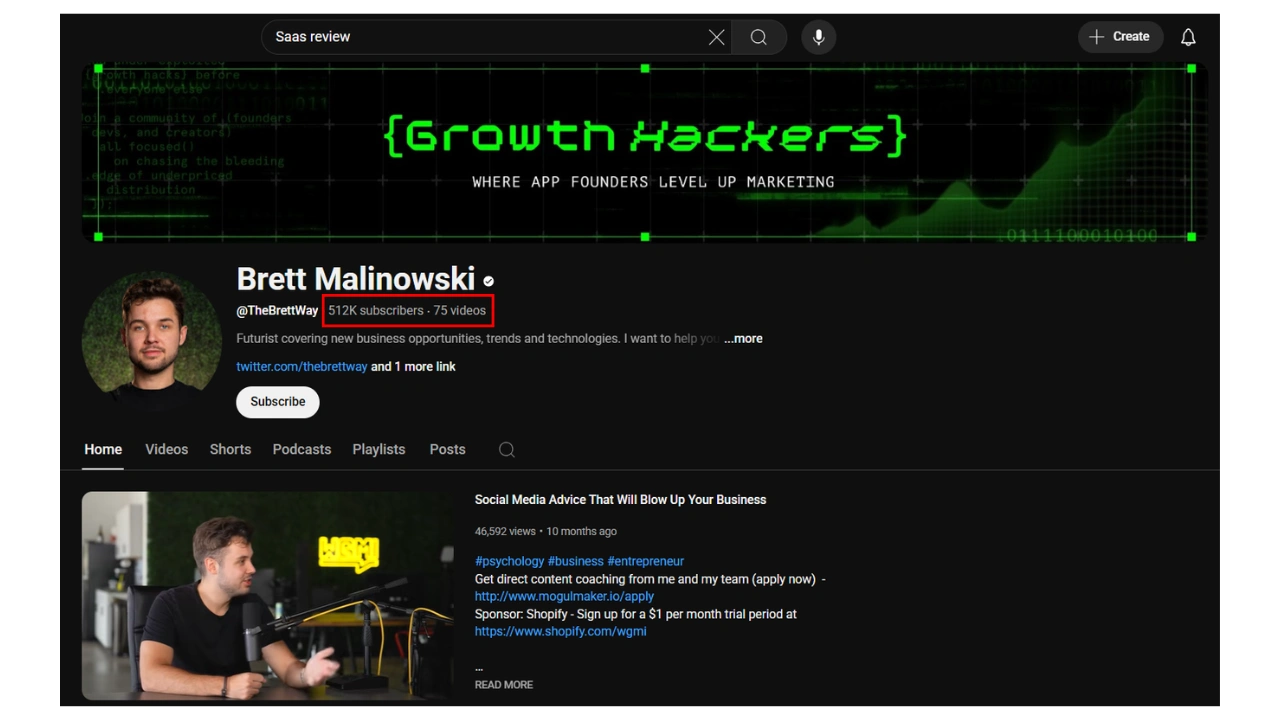
4. Analyze recent video performance (views, likes, comments)
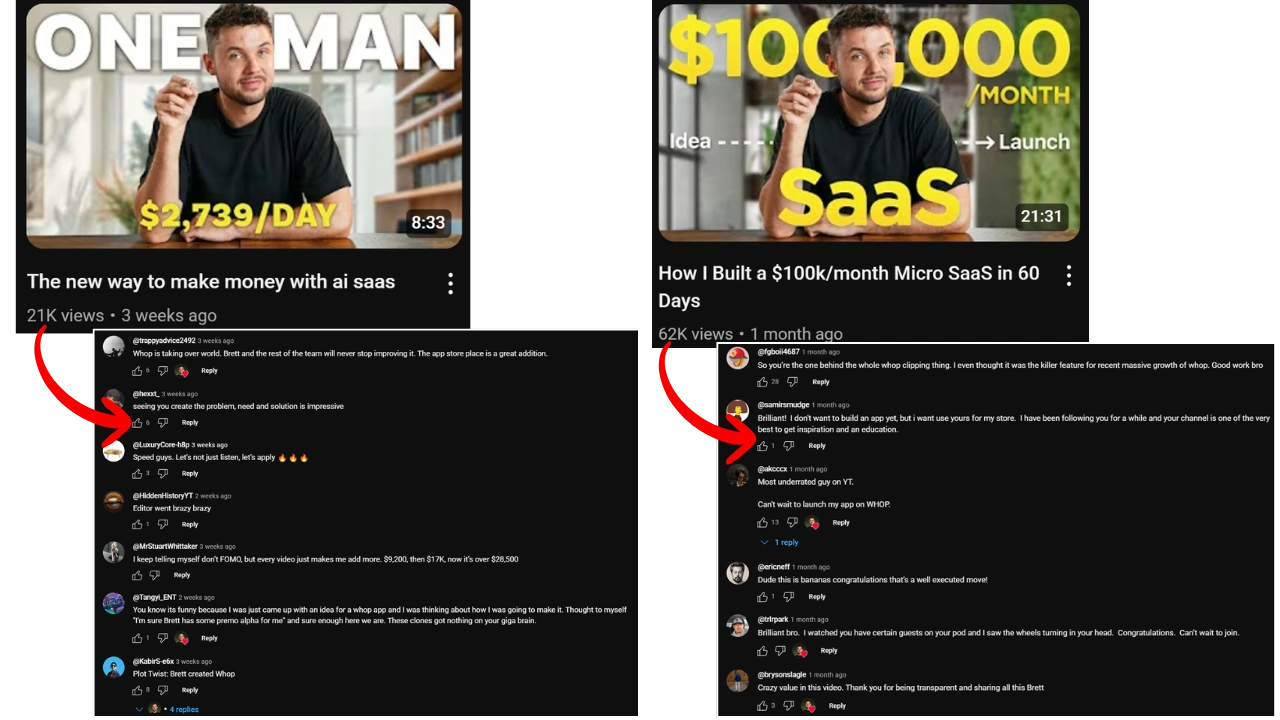
5. Check channel "About" section for business contact information
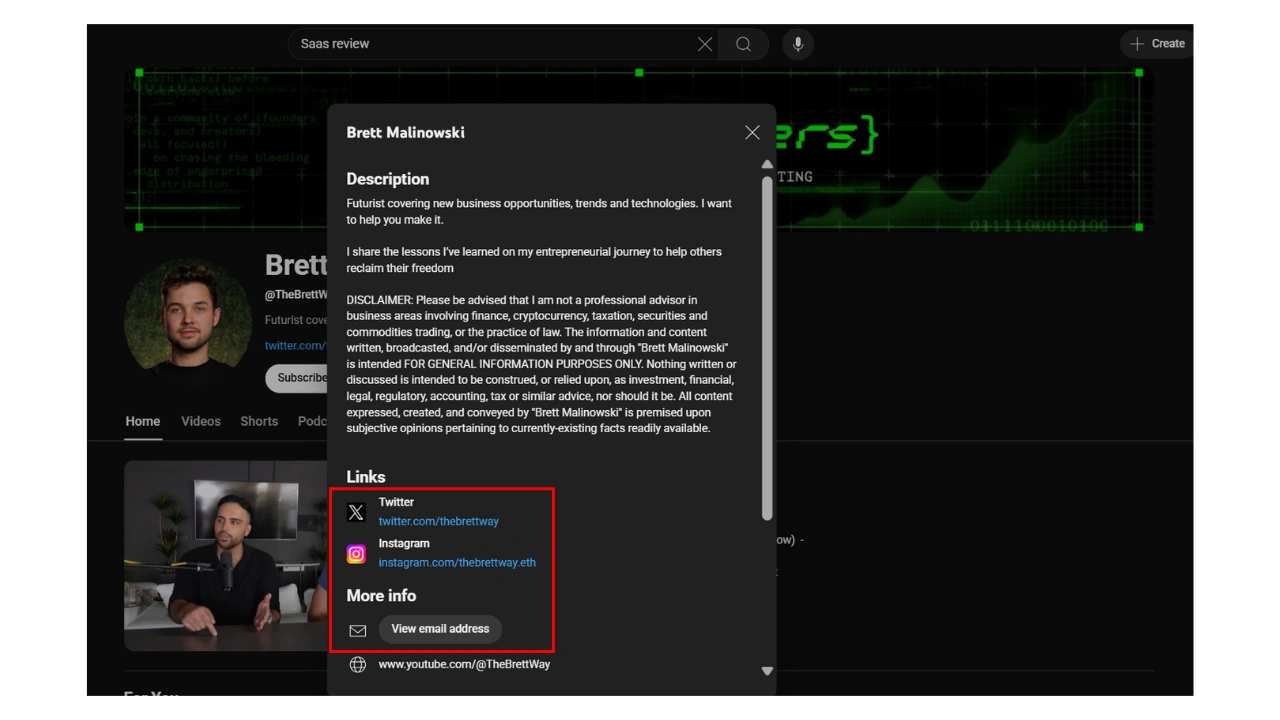
6. Look through video descriptions for brand partnerships or sponsorship disclosures
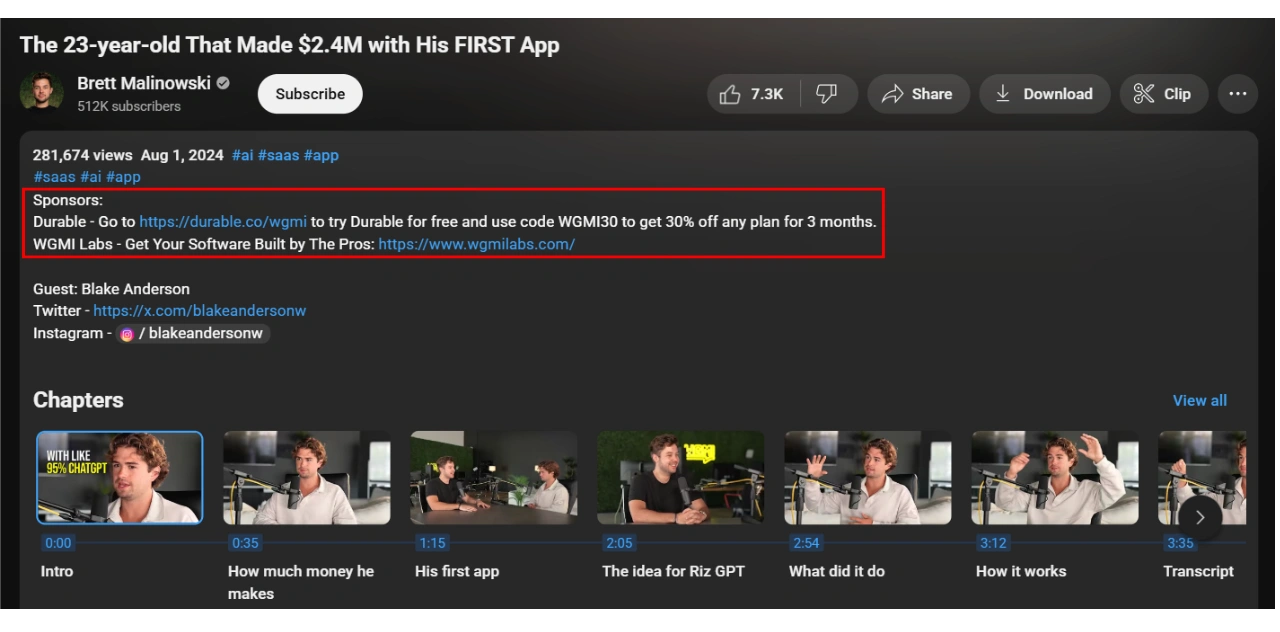
Limitations: No audience demographics, limited engagement analysis tools, time-intensive to assess multiple channels, no authenticity scoring, difficult to track posting consistency.
Step 1: Define Your Ideal Influencer Profile
Industry Expertise: Look for creators with genuine professional background in your target vertical (SaaS, fintech, marketing automation, etc.)
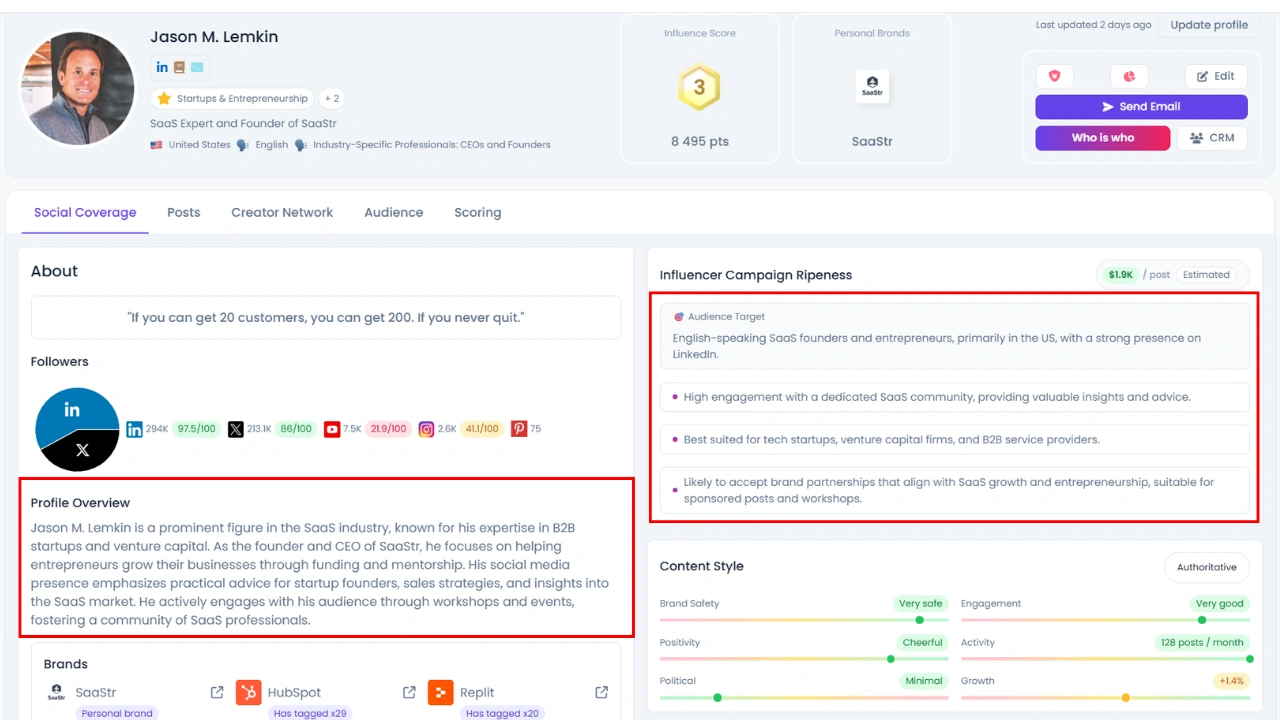
Audience Alignment and Reachability: Prioritize creators whose followers include decision-makers, practitioners, and potential enterprise buyers.
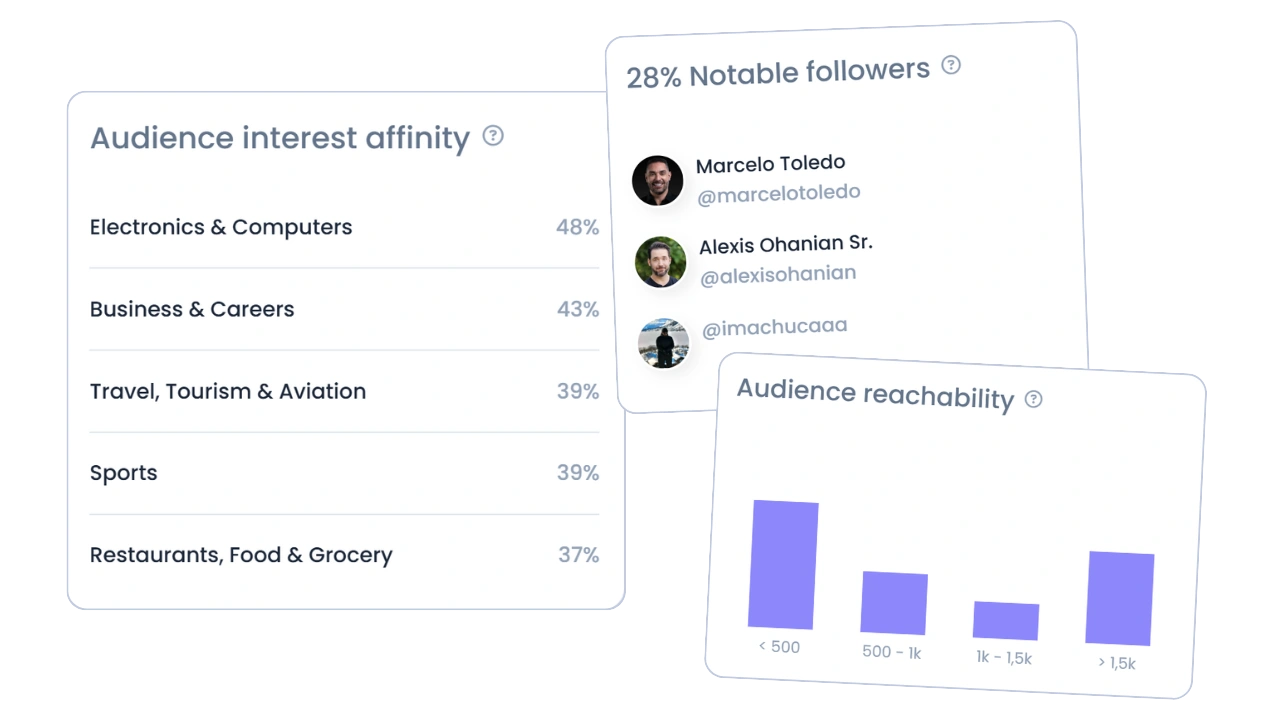
Content Style: Seek thought leadership content, industry expertise, and professional tone over lifestyle content.
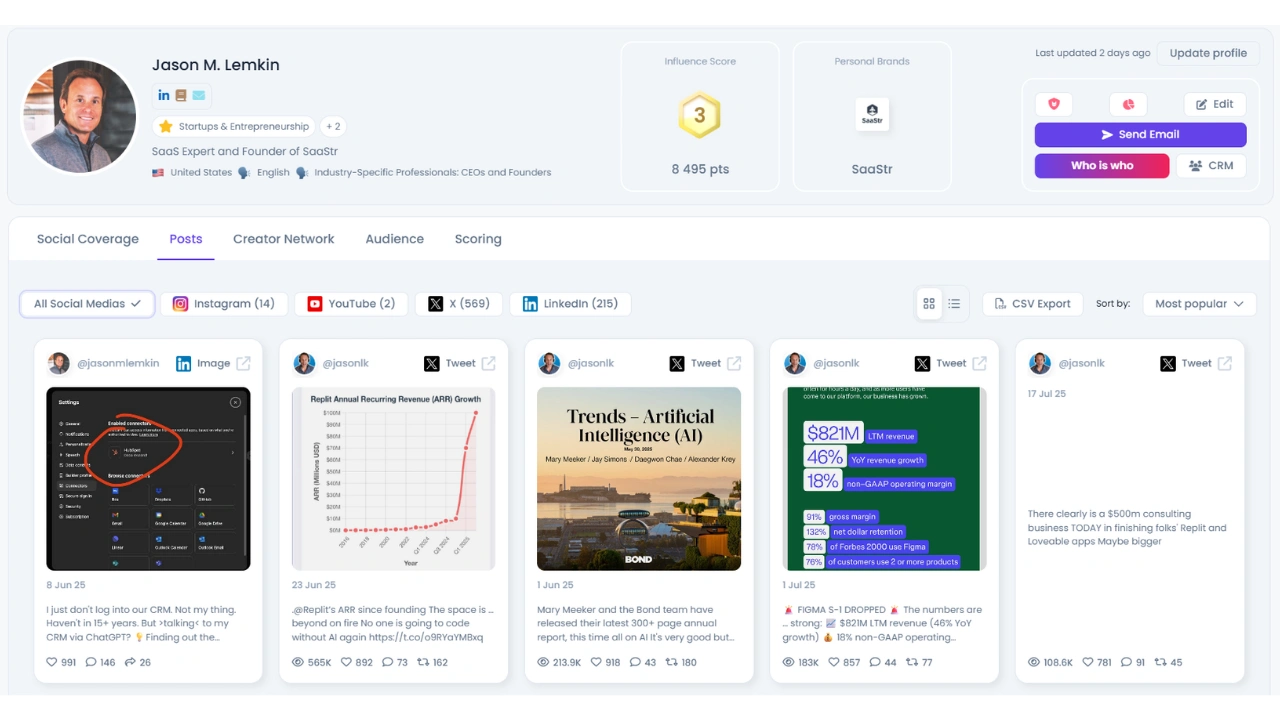
Step 2: Identify Key Characteristics to Consider
Geographic Location: Target creators in markets where your potential customers operate
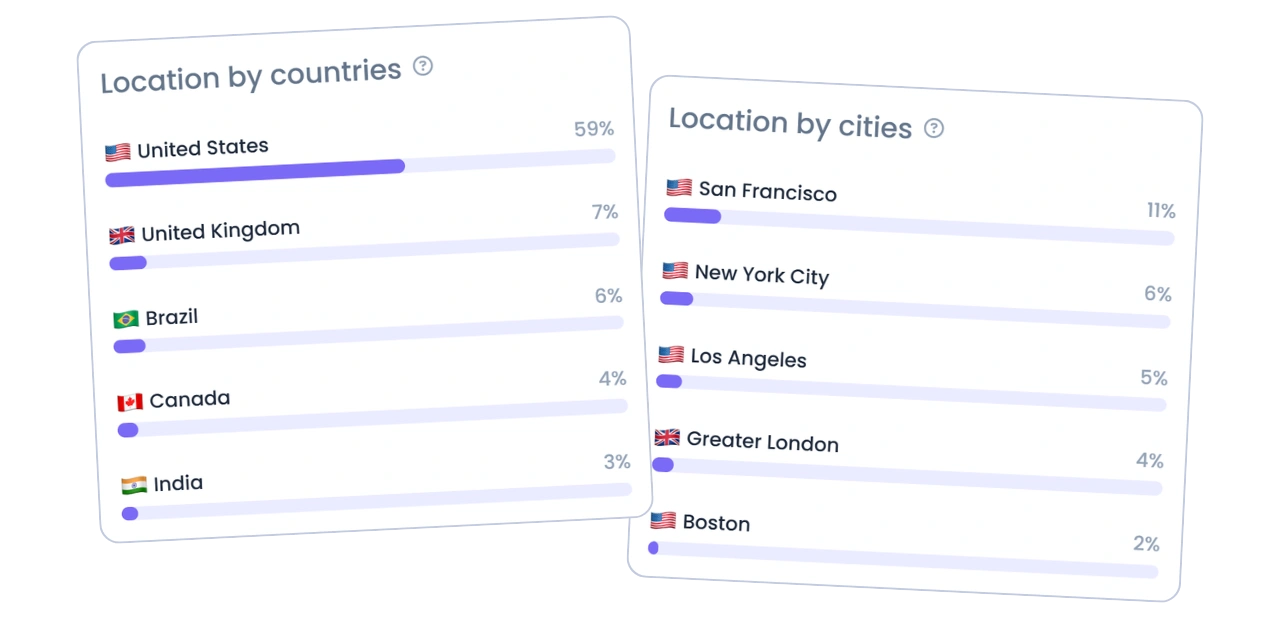
Growth Metrics: Look for consistent growth over 30 days and 1 year periods
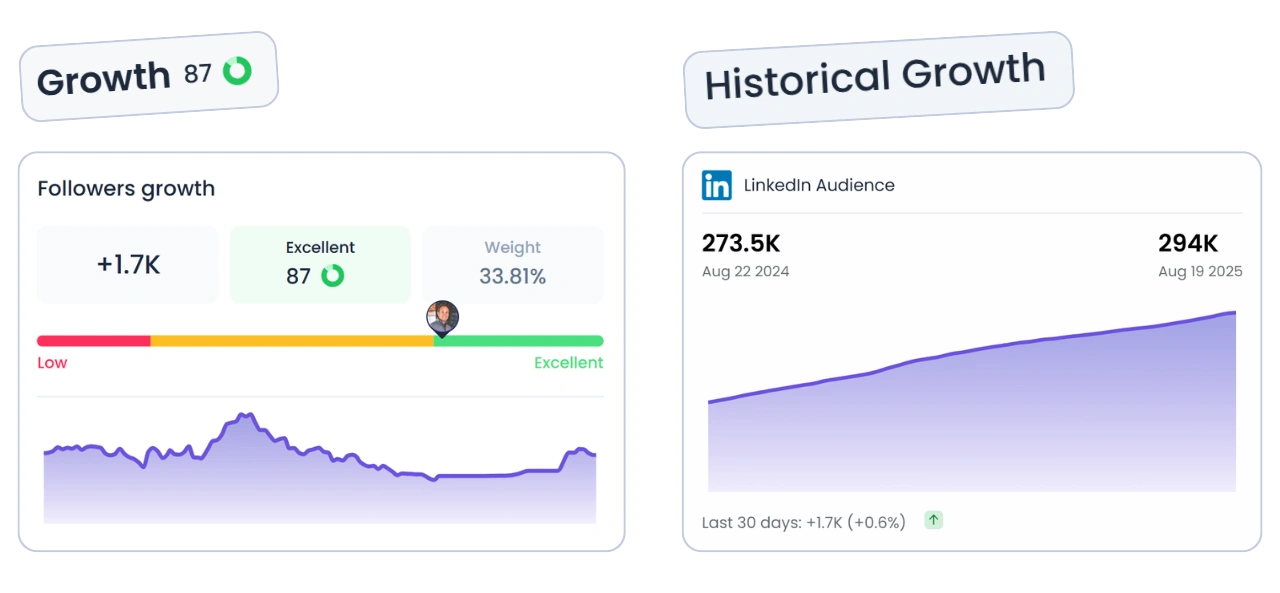
Engagement Quality: Analyze meaningful interactions rather than vanity metrics.
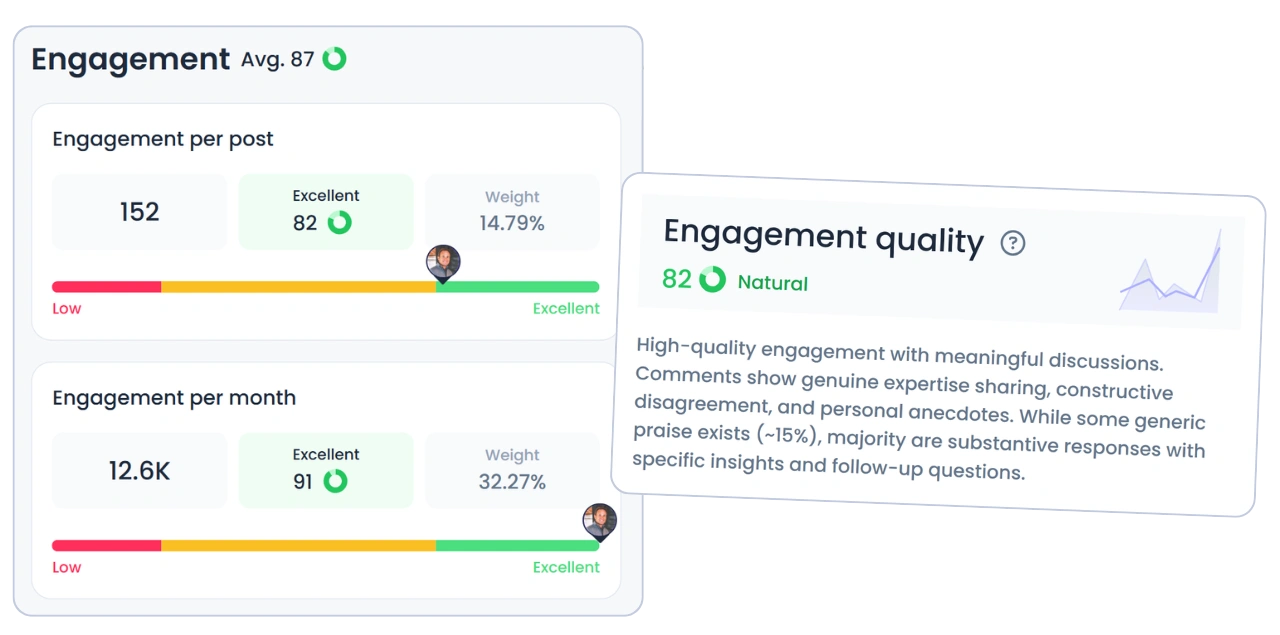
Step 3: Analyze Creator Authenticity and Performance
Authenticity Verification: Check for suspicious activity, bot detection, and genuine expertise
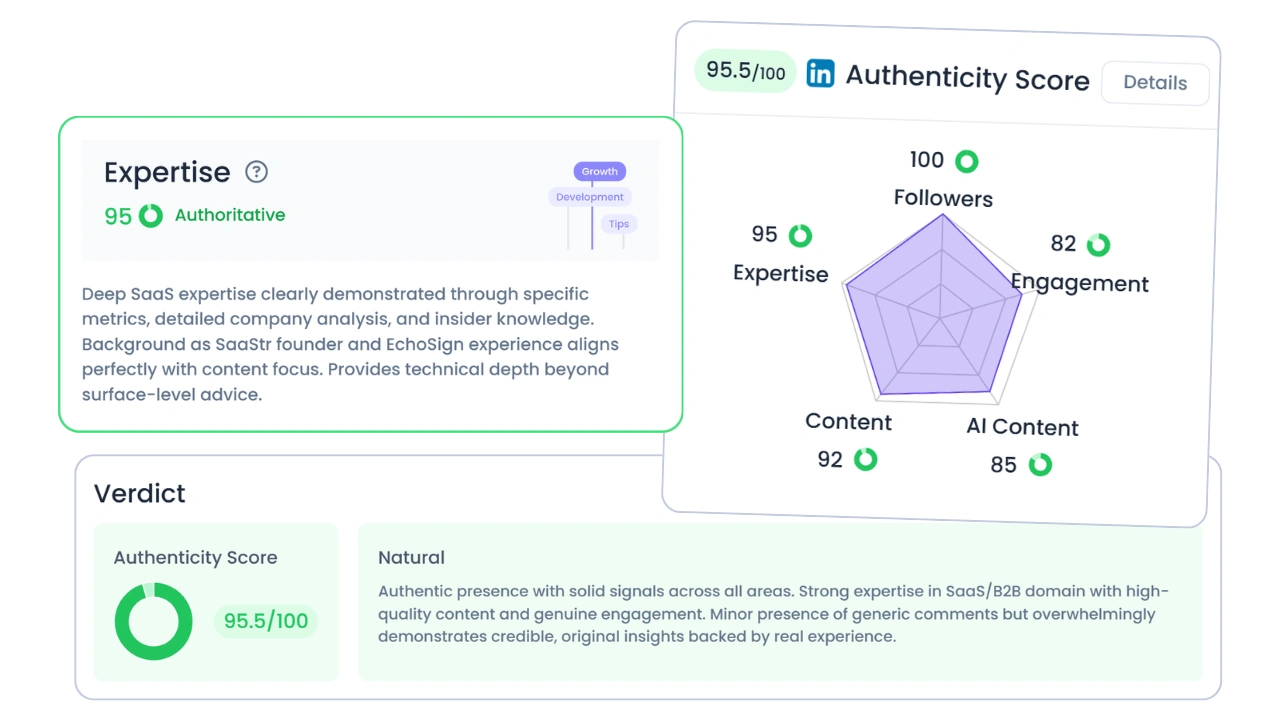
Content Analysis: Understand content quality and audience response
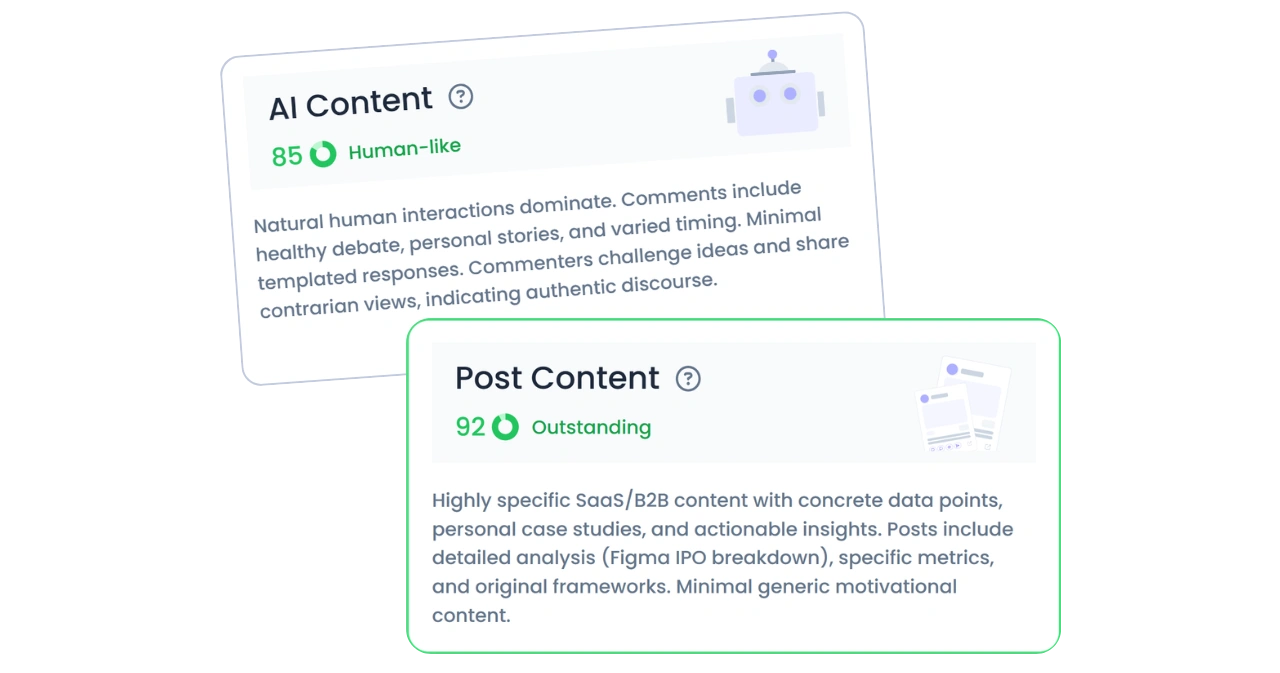
Brand Partnership History: Examine previous collaborations to understand creator experience and brand safety.
With Favikon, you can easily map influencers’ collaborations through Network Watch.
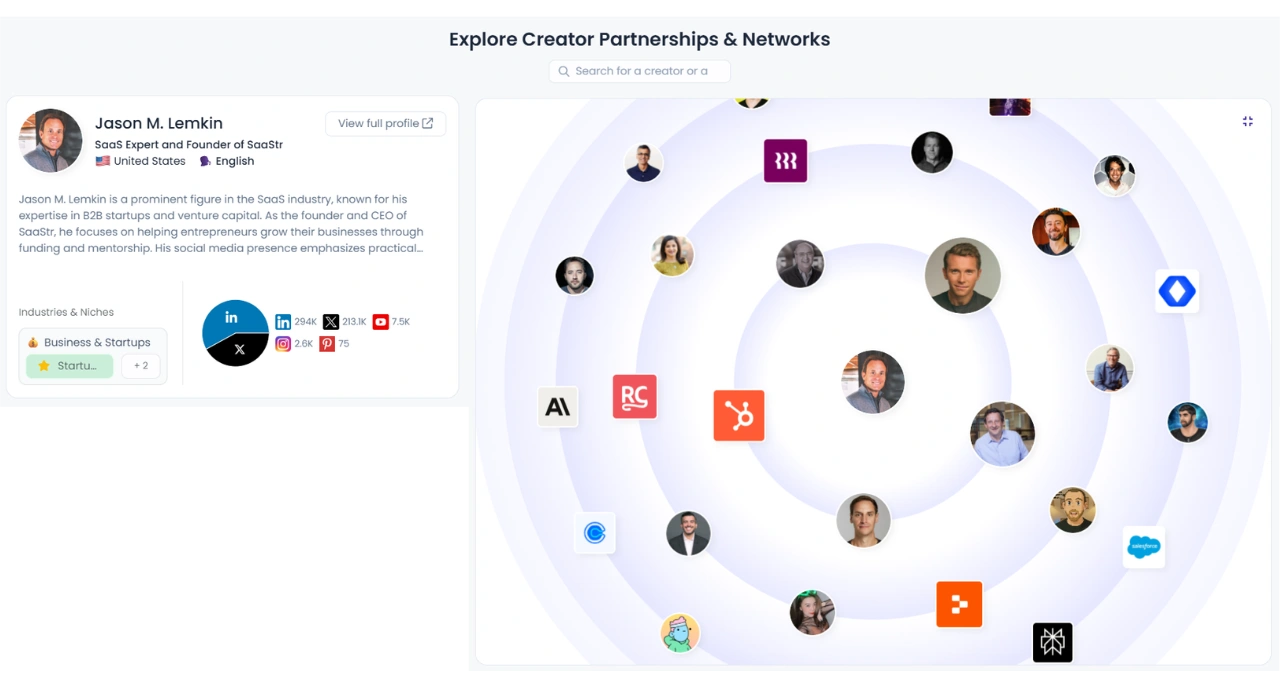
Identify tagging patterns with brands.
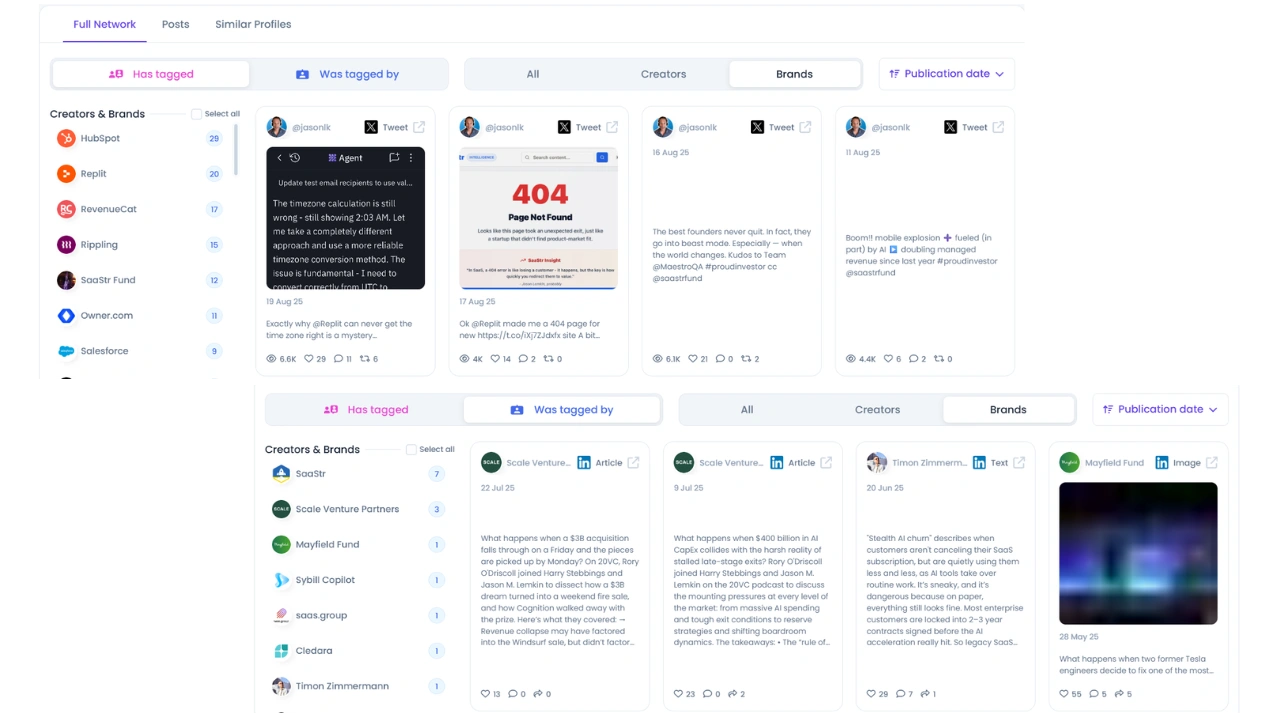
Identify tagging patterns with creators.
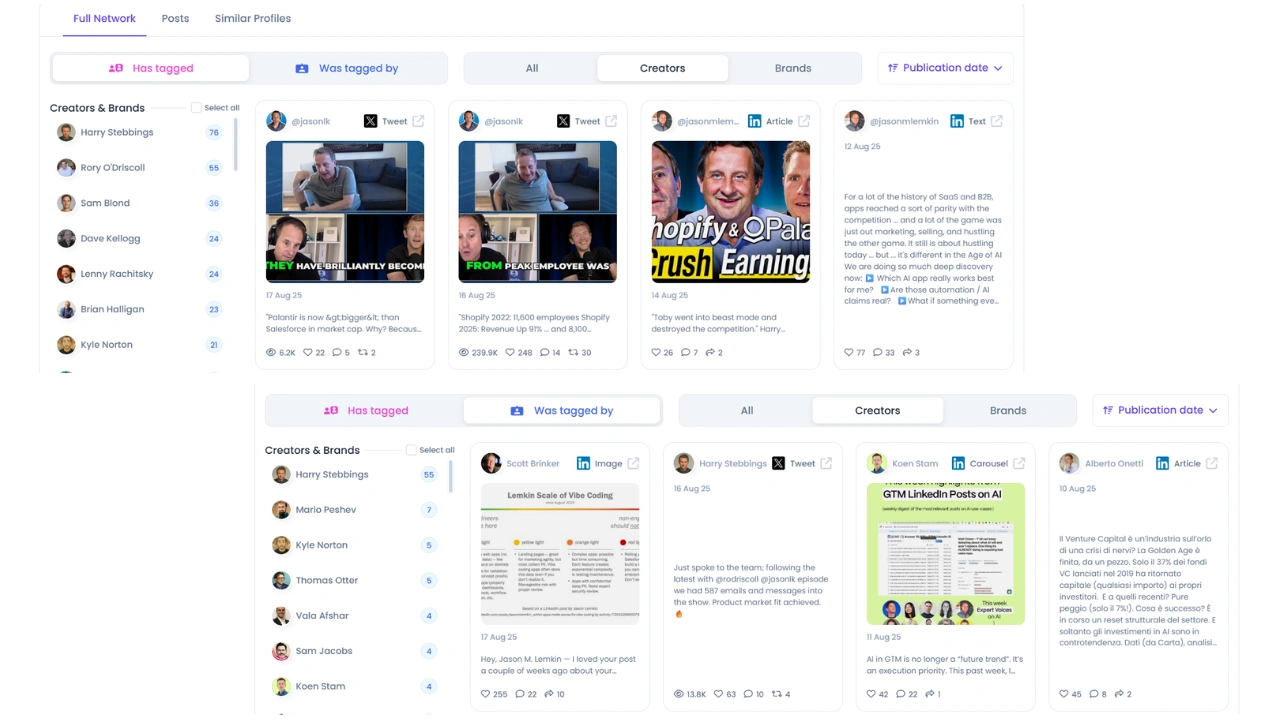
Cross-Platform Presence: Evaluate creators with presence across diverse platforms for broader reach.
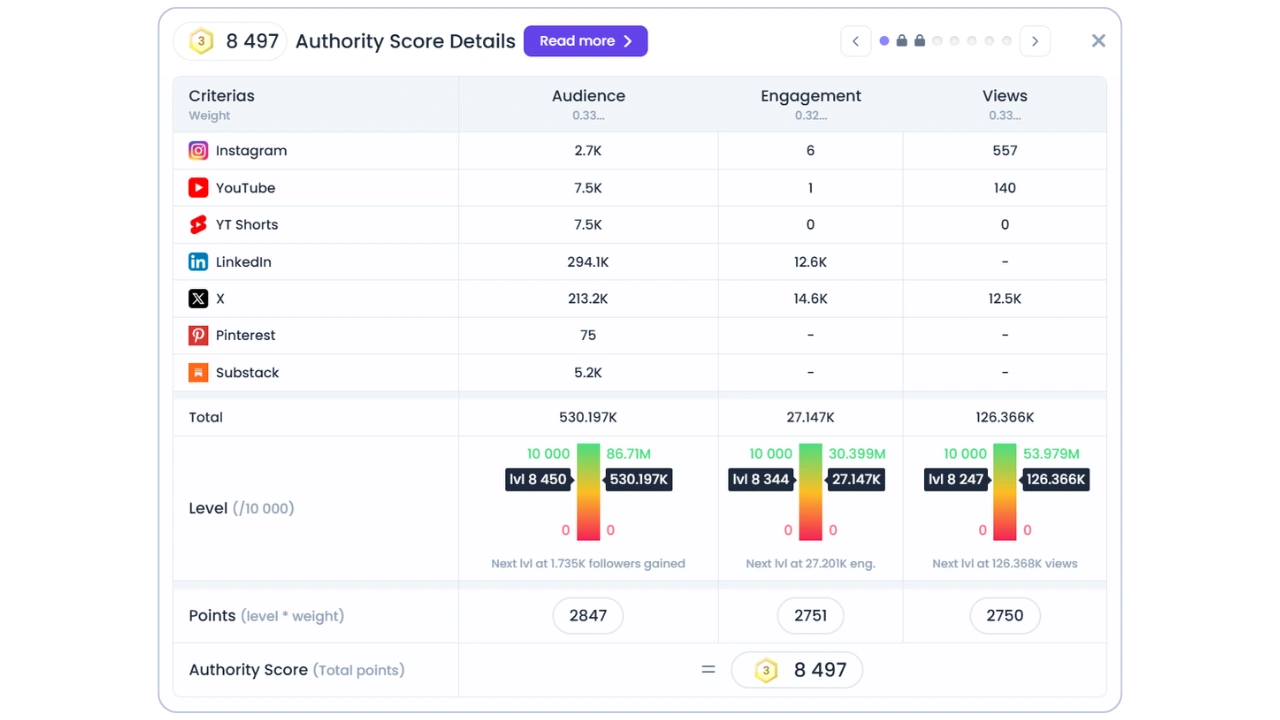
Step 4: Use Favikon's Comprehensive Discovery Features
Favikon provides the only comprehensive B2B influencer discovery platform with:
Advanced Filtering: Search by location, follower count, influencer tier, growth rates, engagement rates, activity frequency, industry niche, and content keywords.
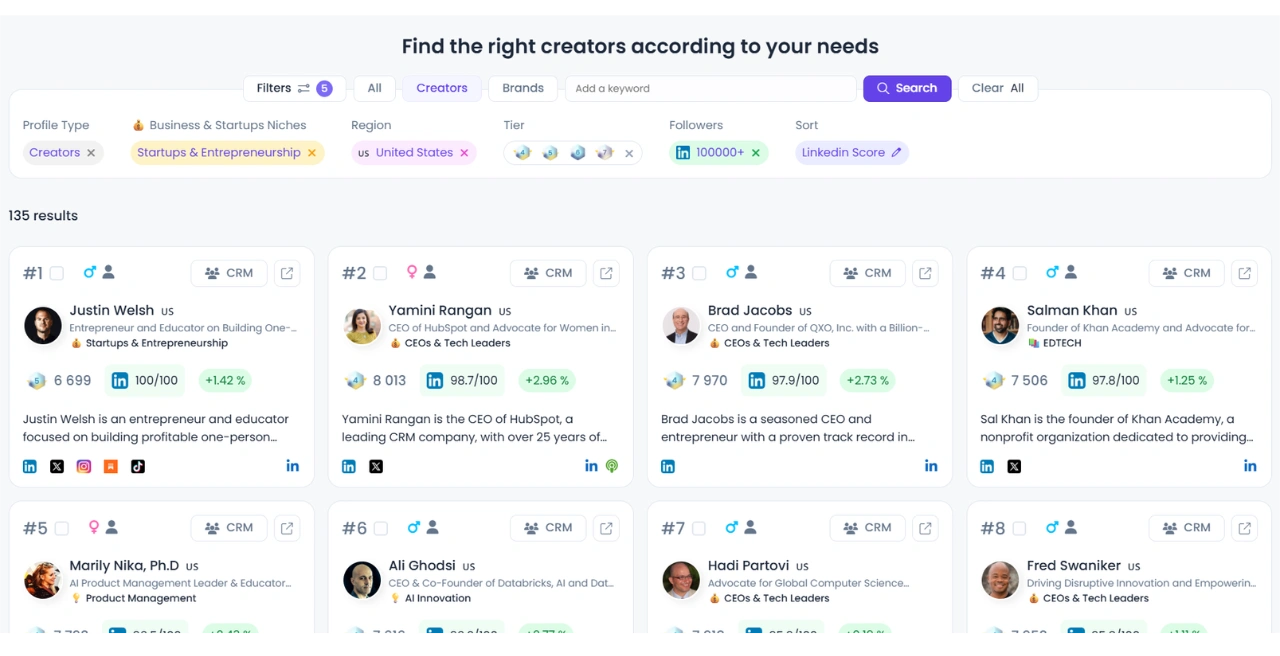
Step 5: Leverage the Chrome Extension for Quick Evaluation
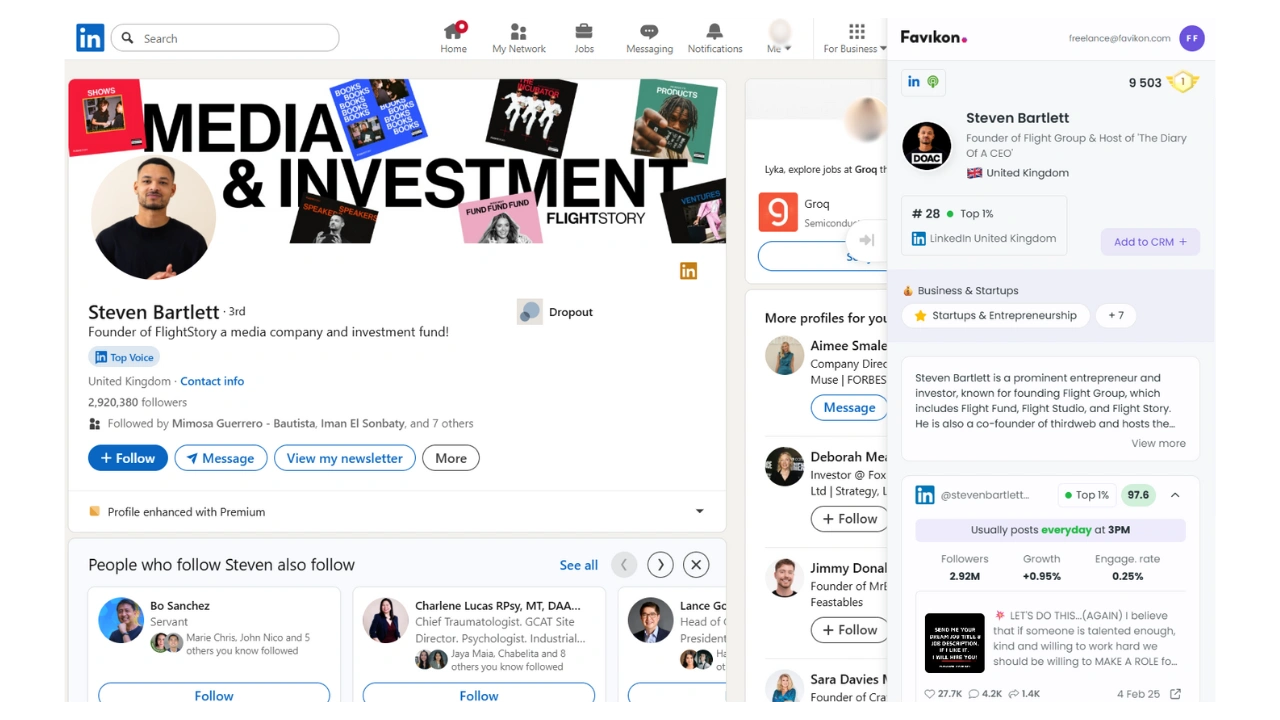
Favikon's Chrome extension provides instant creator insights:
- Quick profile overview with key metrics
- Authenticity and credibility scores
- Recent content performance
- Growth and engagement data
- Connected social handles
Best Practices for B2B Influencer Campaigns
Content-Led Campaign Strategies
Tutorial Content: Partner with creators to produce educational content showing real use cases
Workflow Demonstrations: Showcase how tools integrate into professional workflows
Case Study Features: Present actual results and productivity improvements
Long-Tail Seeding Approach
Rather than single celebrity partnerships, engage multiple niche creators across diverse verticals. This approach:
- Reaches varied professional audiences
- Creates authentic use case diversity
- Builds sustained awareness across multiple touchpoints
- Costs less than single high-profile partnerships
Measurement and Optimization
Track Professional Metrics: Focus on qualified lead generation, trial signups, and enterprise conversions rather than just reach and impressions
Monitor Cross-Platform Impact: Measure how LinkedIn thought leadership drives newsletter subscriptions and YouTube tutorial views
Analyze Long-Term Value: Track how influencer-driven individual users convert to team and enterprise accounts
Getting Started with Favikon
Ready to transform your B2B influencer marketing strategy? Favikon provides the only comprehensive platform designed specifically for PLG SaaS and prosumer brands to discover, analyze, and connect with B2B influencers across LinkedIn, Substack, and YouTube.
Start Your B2B Influencer Discovery Today: Access Favikon's database of verified B2B creators, leverage advanced filtering capabilities, and use authentic performance metrics to build campaigns that drive both individual adoption and enterprise growth.
Try Favikon's Chrome Extension: Get instant creator insights while browsing LinkedIn, YouTube, and Substack to identify potential partnerships in real-time.
Related Articles
See all the articlesResources











.png)
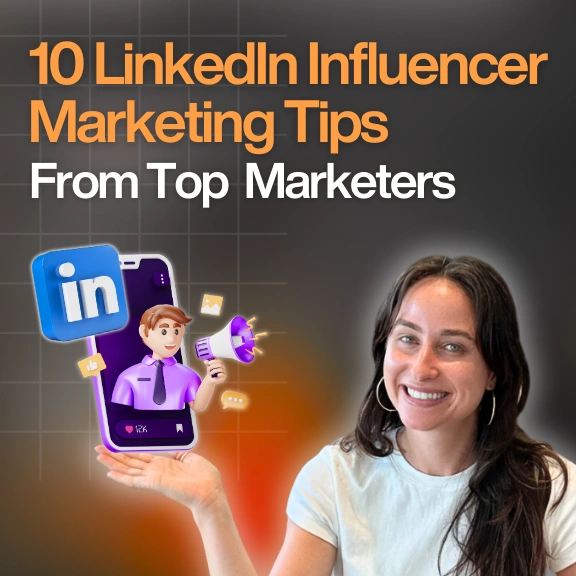





.png)
